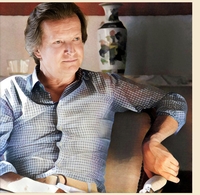Anyone in the wine trade who has visited Bordeaux more than once and has not yet stumbled across a Lurton or two, at least figuratively, must be regarded as still running in amateur mode. It would be like saying, “I know Napa,” and never having been poured a welcoming glass of wine by someone named Mondavi.
The prolific Lurton clan has for years been making fine wines at a couple of dozen different châteaux or more, either as owner or consultant. Without even checking it out, I can count on the fingers of one hand at least six Lurton vintners. Moreover, even though they call Bordeaux home, there are at least a couple of Lurtons who have spent more than a few days every month up in the air visiting properties located in both hemispheres and on at least four continents.
 Which brings us to François Lurton, one of the more-prolific clan members, owning singly or jointly wine estates in France, Spain, Chile and Argentina. Some of the better-known Francois Lurton brands are Mas Janeil from France, Campo Eliseo – with Dany and Michel Rolland – in Spain, Hacienda Araucano in Chile, and Bodega Piedro Negra in Argentina.
Which brings us to François Lurton, one of the more-prolific clan members, owning singly or jointly wine estates in France, Spain, Chile and Argentina. Some of the better-known Francois Lurton brands are Mas Janeil from France, Campo Eliseo – with Dany and Michel Rolland – in Spain, Hacienda Araucano in Chile, and Bodega Piedro Negra in Argentina.
I recently caught up with François by Zoom in one country where he doesn’t make wine – the U.S. – while he was attending a big wholesalers’ convention in Las Vegas, where he was on the program as well as working to promote his “Fumées Blanches,” an affordable Vin de France Sauvignon Blanc.
“How’s business?” was an obvious first question. “Last year, restaurants were still working to reduce inventory, but this year there is more interest in buying,” he replies. “A lot of people say they are coming to Wine Paris,” the February event co-sponsored by Vinexpo whose American attendance depends heavily on whether the visitors are in a buying mood or not.
That said, Lurton adds, “Distributors are now more interested in spirits. It’s difficult to get any attention for wine!” Not that he is at a complete loss in this shift of interest. Lurton has for some time been sourcing grapes from the Gascony region on the Atlantic Coast to make some of his affordable French wines, and to that end was persuaded to produce and market the legendary spirit of the region.
“We are going to launch an Armagnac this month,” he says, and sounding quite excited by the prospect, even though it is not Lurton’s first venture into spirits. In late 2016, he created Sorgin gin and Léonce vermouth. “The gin is made from Sauvignon Blanc grapes,” he says, “and not made from any grain, so it retains those citrus aromas.”
Lurton also sources part of his Sauvignon Blanc from Gascony for Fumées Blanches, which retails in the U.S. for $18, and also obtains the white grape from the Loire, Languedoc and elsewhere. This discussion leads to three other related discussions.
One concerns French wine drinkers’ love of terroir-specific wines from traditional regions. The term “Vin de Pays” on a label in France has generally relegated that wine to supermarket bins of Paris to sell for a couple of euros regardless of its quality or what it costs to make it. A few years ago, Lurton sat on a prestigious committee to develop a new name for this old category of wines that do not come from a recognized DOC. In 2009, they came up with the answer — “Vin de France.”
“There is still a certain resistance in France to these terms,” he admits, “but less so among young people.” To illustrate, while the blend of Fumées Blanches that reaches the U.S. has a Vin de France label, the one sold in France is region-specific in the origin of its grapes – a Côtes de Gascogne – and sells for the equivalent of less than $8.
A second difference with Fumées Blanches is that it is, Lurton says, “one of our few wines that is not organic, but we are working on that.” For some time, all the Lurton estates under his control are either organic or biodynamic. However, buying grapes for high-volume, affordable wines often means purchasing them from growers who are not organic, often because of the labor and certification costs involved.
Which leads to a third interesting topic involving Fumées Blanches – climate change and global warming. Single-estate or single-vineyard wines are becoming more frequently influenced by climate change, good or bad, as their weather can become too hot or too dry to remain ideal for terroir-specific wines. (Europe is increasingly allowing drip irrigation in its vineyards.)
“But with wines such as Fumées Blanches, which blend grapes from different origins, we can profit from the quality of the vintage in each area,” Lurton says. In other words, the best affordable wine for any specific year may be a blend of different regions and not ones made from a single vineyard or area.
Lurton also points out that while his bread-and-butter wines are basic affordable French wines, he does produce higher-quality, collectible wines. “For example, our Piedra Negras Chacayes from Argentina sells for about $100 and has been featured as a Top 10 wine in Wine Spectator’s annual ranking.”
Finally, Lurton invites everyone to come see him – or at least his wine properties. “We have great tourist facilities at all our properties,” he says. “We are also the most developed in Argentina, with a team of five people to receive guests.”
68
